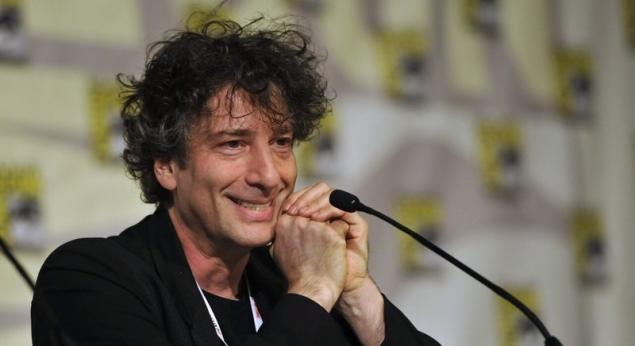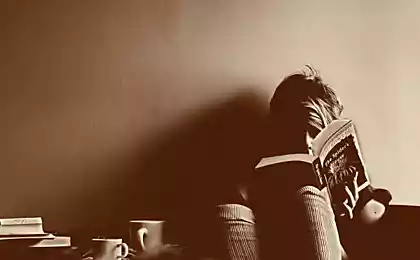765
Why is our future depends on the reading and the imagination
Excellent article writer Neil Gaiman about the nature and benefits of reading. This is not just a vague thought, but a very clear and consistent proof of the seemingly obvious things.
If you have friends-mathematicians, who are asking you, why read fiction, give them the text.
If you have friends who assure you that soon all electronic books will give them the text.
If you fondly (or vice versa with horror) remember trips to the library, read the text.
If you grow up children, read to them this text, but if you just think about that and how to read to children, especially to read this text.

So, I'm going to talk to you about reading and that reading fiction and reading for pleasure is one of the most important things in a person's life.
And I'm obviously very biased, because I'm a writer, author of literary texts. I write for children and adults. For 30 years, I earn my living with words, for the most part creating things and writing them. Sure, I'm interested people to read people to read fiction, to libraries and librarians have existed and have contributed to a love of reading and the existence of places where you can read. So I'm biased as a writer. But I'm more biased as a reader.
Once I was in New York and overheard a conversation about the construction of private prisons - is a rapidly growing industry in America. The prison industry needs to plan its future growth - how many cameras they need? What will be the number of inmates in 15 years? And they found that they could predict all this very easily using a simple algorithm based on surveys, the percentage of 10 and 11 year olds can not read. And, of course, can not read for pleasure.
There's no direct relationship, we can not say that in the educated society is no crime. But the relationship between the factors visible. I think the most simple of these links come from the obvious: Literate people read fiction
. In literature there are two purposes:
Firstly, it opens your dependence on reading. The thirst to know what happens next, the desire to turn the page, need to continue, even if it is hard, because someone is in trouble and you have to find out what it's all over ... in the real drive. It makes learn new words, to think differently, to keep moving forward. Detecting that the reading itself is a delight. Once this is realized, you are on the path to continuous reading.
The easiest way is guaranteed to grow up educated children - is to teach them to read and show that reading - a pleasant entertainment. The most simple - get the books they like, let them access and allow them to read
. There are no bad writers for children, if the children want to read them and look for their books, because all children are different. They find they need stories, and they come into these stories. Beaten-worn idea is not beaten and worn out for them. After all, the child opens it first for yourself. Do not turn away children from reading just because you feel as if they are reading the wrong things. Literature, which you do not like - is the way to books, which may be to your liking. And not all the same taste with you.
And the second thing that makes fiction - it generates empathy. When you watch a TV show or movie, you look at the things that happen to other people. Narrative prose - it is what you make of 33 letters and a handful of punctuation marks, and you, you're the one using your imagination to create a world inhabit it and look around someone else's eyes. You start to feel things, to visit places and worlds, which you would not have learned. You will learn that the outside world - is also to you. You become someone else, and when to return to their world, something in you a little change.
Empathy - a tool that gathers people together and allows you to behave not as narcissistic loner.
You will also find in the books is something vital for the existence of this world. And here it is: the world does not have to be that way. Everything can change.
In 2007, I was in China, the first approved by the party convention for science fiction and fantasy. At some point, I asked the official representative of the government: why? After the NF was not approved a long time. What has changed?
Quite simply, he told me. The Chinese have created a great thing if they bring the scheme. But nothing they did not improve, and do not come up with themselves. They did not invent. And so they sent a delegation to the United States, Apple, Microsoft, Google, and questioned people who came up with the future of their own. And found that those reading science fiction when they were boys and girls.
Literature can show you another world. It can take you to where you've never been. Once visiting other worlds, like those who tasted the magic fruit, you can never be fully satisfied with a world in which grown. Discontent - it's a good thing. Unhappy people can change and improve their worlds, making them better, do them with others.
A sure way to destroy the child's love of reading - is, of course, make sure that there is a number of books. And there are no places where children could read it. I was lucky. When I was growing up, I had a great district library. I had parents who could be persuaded to throw me to the library on the way to work during the holidays.
Library - is freedom. Freedom to read, freedom to communicate. This formation (which is not the end of the day, when we leave school or university), it's leisure, this shelter and this access to information.
I think it's all a matter of the nature of the information. Information has a price, and the correct information is invaluable. Throughout human history, we lived in the time of lack of information. Get the information you need has always been important and is always worth something. When to plant the crop, where to find things, maps, history, and stories - this is something that is always appreciated for the food and in the companies. Information was a valuable thing, and those who possessed it or mined it could count on compensation.
In recent years, we have moved from a lack of information and come to a glut of it. According to Eric Schmidt from the Google, is now every two days the human race creates much information as we made from the beginning of civilization until 2003. It's about five exabytes of information per day, if you love numbers.
Now the challenge is not how to find a rare flower in the desert, and to find concrete plant in the jungle. We need help in the navigation to find what we really need to include this information.
Books - a way to communicate with the dead. It is a way to learn from those who are no longer with us. Mankind has created itself, has evolved, it has given rise to the type of knowledge that can be developed, but not always remember. There are tales that are older than many countries, tales that have survived for a long time and culture wall, where they were first told.
If you do not appreciate the library, so you do not appreciate the information, culture, or wisdom. You choke the voices of the past and the future harm.

We must read aloud to our children. Read them what pleases them. Read them stories, from which we are already tired. To speak in different voices, motivate them and do not stop reading just because they have learned to do it. Make reading aloud a moment of unity, a time when no one is looking in the phone when the temptations of the world set aside.
We need to use the language. To develop, to learn the meaning of new words and how to apply them, to communicate clearly, to say what we mean. We should not try to freeze the language, pretend that it is a dead thing, which must be honored. We need to use the language as a living thing that moves, which bears the words, which allows their values and the pronunciation changed over time.
Writers - especially children's writers - have obligations to readers. We have to write true things, which is especially important when we write stories about the people who did not exist, or where did not happen, to understand that the truth - this is not what really happened, but that tells us, who we are.
After all, literature - is a true lie, among other things. We do not need to bore our readers, but to do so they wanted to turn the next page. One of the best resources for those who are reluctant to read - a story from which they can not break away.
We must speak the truth to our readers, to arm them, give protection and share the wisdom that we had learned from our short stay in this green world. We must not preach, lecture, ready to shove the truth down the throats of our readers, as birds that feed their chicks pre-chewed worms. And we should not ever, for anything in the world, under any circumstances, write for children that we would not want to read yourself.
All of us - adults and children, writers and readers - have dreamed of. We need to invent. It is easy to pretend that no one can change, that we live in a world where society is enormous, and the person is less than nothing, the atom in the wall, a grain of rice field. But the truth is that the person changing the world again and again, the person creating the future, and they do this by imagining that things can be different.
Take a look. I'm serious. Stop for a moment and look at the room where you are. I want to show something so obvious that it all had already forgotten. Here it is: everything you see, including the walls, it was at some point invented. Someone decided that it is much easier to sit on the chair than on the ground, and came up with a chair. Someone had to think of a way that I could talk to you all in London right now, without the risk of getting wet. This room, and all things in it, all the things in the building, in this city exist because time and time again, people come up with something.
We need to make things beautiful. Do not make the world uglier than he was to us, do not devastate the oceans, not to transfer our problems to the next generation. We must clean up after themselves, and not leave our children a world that we are so stupid spoiled, robbed and mutilated.
Once Albert Einstein was asked how we can make our children smarter. His answer was simple and wise. If you want your children to be intelligent, he said, read them stories. If you want them to be more intelligent, read them more fairy tales. He understood the value of reading and imagination.
I hope that we can pass on to our children a world where they will be read, and it will be read, where they will imagine and understand.
Author: Neil Gaiman
If you have friends-mathematicians, who are asking you, why read fiction, give them the text.
If you have friends who assure you that soon all electronic books will give them the text.
If you fondly (or vice versa with horror) remember trips to the library, read the text.
If you grow up children, read to them this text, but if you just think about that and how to read to children, especially to read this text.

So, I'm going to talk to you about reading and that reading fiction and reading for pleasure is one of the most important things in a person's life.
And I'm obviously very biased, because I'm a writer, author of literary texts. I write for children and adults. For 30 years, I earn my living with words, for the most part creating things and writing them. Sure, I'm interested people to read people to read fiction, to libraries and librarians have existed and have contributed to a love of reading and the existence of places where you can read. So I'm biased as a writer. But I'm more biased as a reader.
Once I was in New York and overheard a conversation about the construction of private prisons - is a rapidly growing industry in America. The prison industry needs to plan its future growth - how many cameras they need? What will be the number of inmates in 15 years? And they found that they could predict all this very easily using a simple algorithm based on surveys, the percentage of 10 and 11 year olds can not read. And, of course, can not read for pleasure.
There's no direct relationship, we can not say that in the educated society is no crime. But the relationship between the factors visible. I think the most simple of these links come from the obvious: Literate people read fiction
. In literature there are two purposes:
Firstly, it opens your dependence on reading. The thirst to know what happens next, the desire to turn the page, need to continue, even if it is hard, because someone is in trouble and you have to find out what it's all over ... in the real drive. It makes learn new words, to think differently, to keep moving forward. Detecting that the reading itself is a delight. Once this is realized, you are on the path to continuous reading.
The easiest way is guaranteed to grow up educated children - is to teach them to read and show that reading - a pleasant entertainment. The most simple - get the books they like, let them access and allow them to read
. There are no bad writers for children, if the children want to read them and look for their books, because all children are different. They find they need stories, and they come into these stories. Beaten-worn idea is not beaten and worn out for them. After all, the child opens it first for yourself. Do not turn away children from reading just because you feel as if they are reading the wrong things. Literature, which you do not like - is the way to books, which may be to your liking. And not all the same taste with you.
And the second thing that makes fiction - it generates empathy. When you watch a TV show or movie, you look at the things that happen to other people. Narrative prose - it is what you make of 33 letters and a handful of punctuation marks, and you, you're the one using your imagination to create a world inhabit it and look around someone else's eyes. You start to feel things, to visit places and worlds, which you would not have learned. You will learn that the outside world - is also to you. You become someone else, and when to return to their world, something in you a little change.
Empathy - a tool that gathers people together and allows you to behave not as narcissistic loner.
You will also find in the books is something vital for the existence of this world. And here it is: the world does not have to be that way. Everything can change.
In 2007, I was in China, the first approved by the party convention for science fiction and fantasy. At some point, I asked the official representative of the government: why? After the NF was not approved a long time. What has changed?
Quite simply, he told me. The Chinese have created a great thing if they bring the scheme. But nothing they did not improve, and do not come up with themselves. They did not invent. And so they sent a delegation to the United States, Apple, Microsoft, Google, and questioned people who came up with the future of their own. And found that those reading science fiction when they were boys and girls.
Literature can show you another world. It can take you to where you've never been. Once visiting other worlds, like those who tasted the magic fruit, you can never be fully satisfied with a world in which grown. Discontent - it's a good thing. Unhappy people can change and improve their worlds, making them better, do them with others.
A sure way to destroy the child's love of reading - is, of course, make sure that there is a number of books. And there are no places where children could read it. I was lucky. When I was growing up, I had a great district library. I had parents who could be persuaded to throw me to the library on the way to work during the holidays.
Library - is freedom. Freedom to read, freedom to communicate. This formation (which is not the end of the day, when we leave school or university), it's leisure, this shelter and this access to information.
I think it's all a matter of the nature of the information. Information has a price, and the correct information is invaluable. Throughout human history, we lived in the time of lack of information. Get the information you need has always been important and is always worth something. When to plant the crop, where to find things, maps, history, and stories - this is something that is always appreciated for the food and in the companies. Information was a valuable thing, and those who possessed it or mined it could count on compensation.
In recent years, we have moved from a lack of information and come to a glut of it. According to Eric Schmidt from the Google, is now every two days the human race creates much information as we made from the beginning of civilization until 2003. It's about five exabytes of information per day, if you love numbers.
Now the challenge is not how to find a rare flower in the desert, and to find concrete plant in the jungle. We need help in the navigation to find what we really need to include this information.
Books - a way to communicate with the dead. It is a way to learn from those who are no longer with us. Mankind has created itself, has evolved, it has given rise to the type of knowledge that can be developed, but not always remember. There are tales that are older than many countries, tales that have survived for a long time and culture wall, where they were first told.
If you do not appreciate the library, so you do not appreciate the information, culture, or wisdom. You choke the voices of the past and the future harm.

We must read aloud to our children. Read them what pleases them. Read them stories, from which we are already tired. To speak in different voices, motivate them and do not stop reading just because they have learned to do it. Make reading aloud a moment of unity, a time when no one is looking in the phone when the temptations of the world set aside.
We need to use the language. To develop, to learn the meaning of new words and how to apply them, to communicate clearly, to say what we mean. We should not try to freeze the language, pretend that it is a dead thing, which must be honored. We need to use the language as a living thing that moves, which bears the words, which allows their values and the pronunciation changed over time.
Writers - especially children's writers - have obligations to readers. We have to write true things, which is especially important when we write stories about the people who did not exist, or where did not happen, to understand that the truth - this is not what really happened, but that tells us, who we are.
After all, literature - is a true lie, among other things. We do not need to bore our readers, but to do so they wanted to turn the next page. One of the best resources for those who are reluctant to read - a story from which they can not break away.
We must speak the truth to our readers, to arm them, give protection and share the wisdom that we had learned from our short stay in this green world. We must not preach, lecture, ready to shove the truth down the throats of our readers, as birds that feed their chicks pre-chewed worms. And we should not ever, for anything in the world, under any circumstances, write for children that we would not want to read yourself.
All of us - adults and children, writers and readers - have dreamed of. We need to invent. It is easy to pretend that no one can change, that we live in a world where society is enormous, and the person is less than nothing, the atom in the wall, a grain of rice field. But the truth is that the person changing the world again and again, the person creating the future, and they do this by imagining that things can be different.
Take a look. I'm serious. Stop for a moment and look at the room where you are. I want to show something so obvious that it all had already forgotten. Here it is: everything you see, including the walls, it was at some point invented. Someone decided that it is much easier to sit on the chair than on the ground, and came up with a chair. Someone had to think of a way that I could talk to you all in London right now, without the risk of getting wet. This room, and all things in it, all the things in the building, in this city exist because time and time again, people come up with something.
We need to make things beautiful. Do not make the world uglier than he was to us, do not devastate the oceans, not to transfer our problems to the next generation. We must clean up after themselves, and not leave our children a world that we are so stupid spoiled, robbed and mutilated.
Once Albert Einstein was asked how we can make our children smarter. His answer was simple and wise. If you want your children to be intelligent, he said, read them stories. If you want them to be more intelligent, read them more fairy tales. He understood the value of reading and imagination.
I hope that we can pass on to our children a world where they will be read, and it will be read, where they will imagine and understand.
Author: Neil Gaiman
























